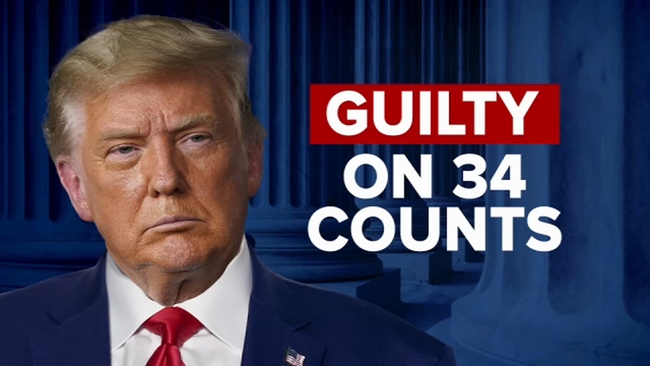In a historic ruling, former President Donald Trump became the first U.S. president to be convicted of a crime when a New York jury found him guilty of falsifying documents to cover up a payment to silence a porn star ahead of the 2016 election. The jury’s decision came after two days of deliberation, finding Trump guilty on all 34 counts he faced.
The 12-member jury unanimously agreed on the verdict, which required full consensus. Trump, who was present in the courtroom, maintained a stoic demeanor as the jurors were individually polled to confirm their guilty verdicts.

Justice Juan Merchan, who presided over the case, scheduled Trump’s sentencing for July 11, just three days before the Republican National Convention, where Trump is expected to be formally nominated as the party’s presidential candidate. Merchan expressed gratitude to the jurors for their service, emphasizing their autonomy in the decision-making process.
“This was a disgrace. This was a rigged trial by a conflicted judge who is corrupt,” Trump told reporters following the verdict. “The real verdict is going to be Nov. 5 by the people. I am a very innocent man.”
The verdict has significant implications for the upcoming November 5 presidential election, as Trump, the Republican candidate, aims to reclaim the White House from Democratic President Joe Biden. Despite the conviction, Trump has denied any wrongdoing and is expected to appeal the decision.
Trump faces a maximum sentence of four years in prison, although similar convictions often result in shorter sentences, fines, or probation. His incarceration would not preclude him from campaigning or taking office if he were to win the election. Polls indicate a tight race between Trump and Biden, with some suggesting the guilty verdict could impact Trump’s support among independent and Republican voters.
The trial, which lasted five weeks, included explicit testimony from porn star Stormy Daniels about an alleged sexual encounter with Trump in 2006, while he was married to his current wife, Melania. Trump has denied the affair. Michael Cohen, Trump’s former fixer, testified that Trump approved a $130,000 hush money payment to Daniels during the final weeks of the 2016 election, amidst multiple accusations of sexual misconduct. Cohen, who handled the payment, testified that Trump approved a reimbursement plan disguised as legal fees. Trump’s defense attacked Cohen’s credibility, highlighting his criminal record and history of lying.

Typically, falsifying business documents is a misdemeanor in New York, but prosecutors elevated the charges to felonies, arguing that Trump was concealing an illegal campaign contribution. Trump has consistently claimed he could not receive a fair trial in his predominantly Democratic hometown.
This case is considered the least consequential among the four criminal prosecutions Trump faces. The charges focused on ledger accounts and records related to Cohen’s reimbursement. Known as the “zombie case,” it was revived by Manhattan District Attorney Alvin Bragg after his predecessor decided not to press charges.
This trial is likely the only one to proceed before the election, with the other cases delayed by procedural challenges. If re-elected, Trump could potentially shut down the two federal cases accusing him of attempting to overturn his 2020 election loss and mishandling classified documents. However, he would not have the authority to stop a separate election-subversion case in Georgia. Trump has pleaded not guilty in all cases, framing his legal issues as a political attack by Biden’s allies.
The jury notified the court of their decision at 4:20 p.m. (2020 GMT) and read out the guilty verdicts on all 34 counts shortly after 5 p.m. Fellow Republicans quickly condemned the verdict. “Today is a shameful day in American history,” said House of Representatives Speaker Mike Johnson in a prepared statement.
Source: Dailymail.com



